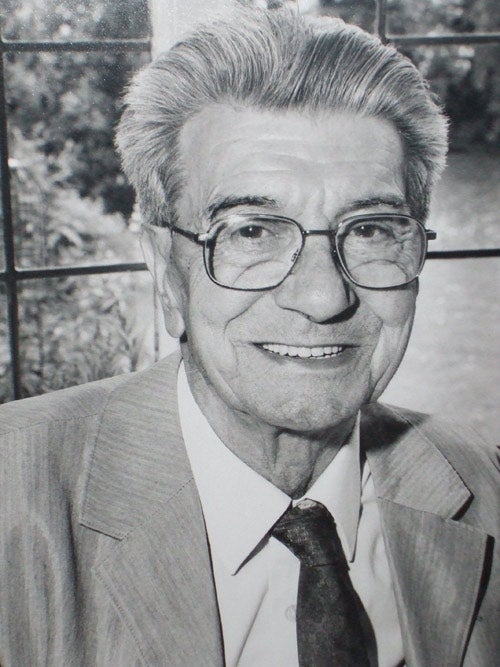Professor Dennis Lees: Industrial economist who was a staunch believer in the free market

Your support helps us to tell the story
From reproductive rights to climate change to Big Tech, The Independent is on the ground when the story is developing. Whether it's investigating the financials of Elon Musk's pro-Trump PAC or producing our latest documentary, 'The A Word', which shines a light on the American women fighting for reproductive rights, we know how important it is to parse out the facts from the messaging.
At such a critical moment in US history, we need reporters on the ground. Your donation allows us to keep sending journalists to speak to both sides of the story.
The Independent is trusted by Americans across the entire political spectrum. And unlike many other quality news outlets, we choose not to lock Americans out of our reporting and analysis with paywalls. We believe quality journalism should be available to everyone, paid for by those who can afford it.
Your support makes all the difference.Dennis Lees spent the last 15 years of his career as Professor and Head of the Department of Industrial Economics at Nottingham University, retiring in 1982 as Professor Emeritus. He had overcome adversity to achieve international recognition and made significant contributions to policy debate, on welfare and healthcare in particular.
Lees was born in 1924 in Sandiacre, Derbyshire, the eldest of five children. He left school to become an apprentice carpenter, a job which he really enjoyed, but he was struck down by polio at 18 and carried the consequent deformity throughout his life, with severely restricted mobility and frequent pain.
In a move that exemplified his whole approach to life, he completely switched direction and returned to further academic study. He began at Derby College, moving on to become one of the last cohort of students at University College Nottingham before it became Nottingham University, graduating in 1948 with an external London degree in Economics. He obtained his PhD in 1951 on the topic of British monetary policy, 1932-39.
In 1951 he joined the staff of the University College of North Staffordshire (later Keele University) and became Professor of Economics at University College, Swansea in 1965. In 1968 he became only the second holder of the post of Professor of Industrial Economics and Head of the Department at Nottingham University.
Despite his difficulties with travel, Lees held visiting posts at Reed College in Portland, Oregon (1958-59), the University of Chicago (1963-64) and the University of Sydney (1976). His time at Chicago was particularly influential on his later career as it gave him the opportunity to debate with leading scholars (later Nobel prize-winners) such as Milton Friedman and Ronald Coase.
His greatest strengths were the penetrating focus of his mind and the ability to express complex ideas succinctly and with remarkable clarity. His most important contributions came frequently through writings directed at a wider audience, rather than academic journals, and getting to the heart of a policy debate. Lees always maintained that his training as a carpenter helped him to identify the underlying nature of a problem.
He was a staunch believer in the importance of the individual having control of his own destiny and the primacy of market solutions to economic questions. Not surprisingly, he had a long and strong association with the Institute of Economic Affairs, the free-market think-tank, and remained an Honorary Fellow until his death.
His research and writings covered areas such as antitrust, mergers, the economics of industrial accidents, industrial training and finance for small firms. His penetrating analysis in The Economic Consequences of the Professions (1966) was a landmark in this type of research. Lees served on several government committees during the 1970s, including the National Insurance Advisory Committee and the Industrial Injuries Advisory Council, of which he became chairman in 1974. This work also led to the influential publications Impairment, Disability and Handicap (1974) and The Economics of Personal Injury (1976).
At the time of his appointment in 1968, Nottingham had departments of both Economics and Industrial Economics. Lees was a fierce defender of the necessity to maintain the latter as an independent unit notwithstanding considerable opposition. His stance proved of enormous subsequent benefit to the university some years later at the founding of the highly successful Nottingham University Business School.
Lees was a superb teacher, particularly of postgraduates, and it is notable how many of his young protégés have gone on to distinguished careers. He engendered enormous respect among his colleagues, even though at times he was a very hard taskmaster. He retired from his post at Nottingham in 1982.
Dennis Lees was an avid supporter of cricket and a longtime member of Nottinghamshire County Cricket Club. One of his greatest pleasures was seeing Deryck Murray, the West Indian Test wicket-keeper, graduate from the Industrial Economics department at Nottingham as a mature student. Despite his disability, Lees was an accomplished swimmer.
Brian Chiplin
Dennis Samuel Lees, carpenter and industrial economist: born Sandiacre, Derbyshire 20 July 1924; Lecturer and Reader in Economics, University College of North Staffordshire (later Keele University) 1951-65; Professor of Economics, University College, Swansea 1965-67; Professor of Industrial Economics 1968-82 (Emeritus); CBE 1980; married 1950 Elizabeth Bretisch (died 1992; two sons, and one daughter deceased); died Nottingham 11 February 2008.
Join our commenting forum
Join thought-provoking conversations, follow other Independent readers and see their replies
Comments